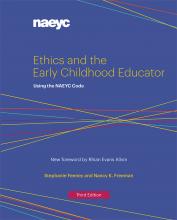Ethics and the Early Childhood Educator: Using the NAEYC Code, Third Edition

About the Book
Do you need support and guidance to help you navigate tough ethical issues in your work? The NAEYC Code of Ethical Conduct is every early childhood educator’s foundation for moral practice, and this third edition of Ethics and the Early Childhood Educator shows you how to use the Code to guide your actions and responses to challenging situations in the workplace.
Here, you’ll find real cases from early childhood programs that illustrate the process of identifying and addressing ethical issues by applying the NAEYC Code. Reflection questions encourage you to think deeply about how your own experiences relate to the examples. Ethical conduct is critical, and the Code and this book are resources you can turn to again and again as you seek to make the right decisions for young children and their families.
Table of Contents
- Foreword
- Preface
-
Chapter 1: An Introduction to Ethics
- The Early Childhood Educator as a Person
- What Is a Profession?
- Professional Values and Professional Ethics
-
Chapter 2: The NAEYC Code of Ethical Conduct
- Why Does Early Childhood Education Need a Code of Ethics?
- History and Organization of the NAEYC Code of Ethics
- Supplements to the Code
- The Issue of Code Enforcement
-
Chapter 3: Addressing Ethical Issues
- Ethical Responsibilities
- Ethical Dilemmas
- Analyzing and Addressing Workplace Issues: A Framework
- 1. Identify the Conflicting Responsibilities
- 2. Brainstorm Possible Resolutions
- 3. Consider Ethical Finesse
- 4. Look for Guidance in the NAEYC Code
- 5. Decide on a Justifiable Course of Action
- Implement Your Resolution and Reflect
- Advice About Difficult Dilemmas
- Your Stage of Professional Development and Ethical Issues
- How Ethical Dilemmas Are Presented in this Book
-
Chapter 4: Ethical Responsibilities to Children
- Ideals
- Principles
-
Typical Issues Involving Ethical Responsibilities to Children
- Case 1: Child with Aggressive Behavior
- Case 2: Child with Emotional and Behavioral Issues
- Case 3: Suspected Child Abuse
- Reflection on Ethical Situations that Involve Children
-
Chapter 5: Ethical Responsibilities to Families
- Ideals
- Principles
-
Typical Ethical Issues Involving Families
- Case 4: The Nap
- Case 5: Messy Play
- Case 6: Don’t Let My Son Dress Up as a Girl!
- Case 7: Reporting Classroom Behavior
- Case 8: Birthday Cake
- Reflection on Complex-Client Cases
-
Chapter 6: Ethical Responsibilities to Colleagues
- Ideals
- Principles
-
Typical Ethical Dilemmas Involving Colleagues
- Case 9: Personal Business
- Case 10: Teacher Talk
- Case 11: No Hugging
- Case 12: Difficult Working Relationship
- Reflection on Situations that Involve Teacher Relationships
-
Chapter 7: Ethical Responsibilities to Community and Society
- Ideals
- Principles
-
Typical Ethical Dilemmas Involving Community and Society
- Case 13: Violating Licensing Regulations
- Case 14: Ineffective Child Protective Services Agency
- Case 15: Standardized Testing in Kindergarten
- Reflection on Cases that Involve Advocacy
-
Chapter 8: The Code of Ethics and You
- The Role of Ethics in Early Childhood Education
- NAEYC and Ethics
- The Future of Ethics in Early Childhood Education
- Your Future, Your Commitment to the Code
- Reflection Questions
- Glossary
- References
- Appendix A: History and Development of the NAEYC
- Code of Ethical Conduct and Its Supplements
- Appendix B: NAEYC Code of Ethical Conduct and Statement of Commitment
- Appendix C: Code of Ethical Conduct—Supplement for Early Childhood Program Administrators
- Acknowledgments
- About the Authors
Book Details
ISBN: 978-1-938113-33-8
Publish Date: 2018
Related Resources
Online Articles
Focus on Ethics: Ethical Finesse—A Strategy To Resolve Ethical Issues - This Focus on Ethics column asks you to consider how to respond to Mr. Jackson—the father of 4-year-old Victor—who insists that his son not be permitted to play with clothes or accessories typically associated with girls and women. (Young Children, March 2017)
Focus on Ethics: "Make Sure My Child Drinks Her Milk!" —The Response - The scenario presented in this article is a good example of how having a clear understanding of your ethical responsibilities can help you know what to do and can support your actions when situations like this emerge. (Young Children, September 2016)
Focus on Ethics: Ethical Issues—Responsibilities and Dilemmas - Read this article from the authors of Ethics and the Early Childhood Educator to learn more about the differences between an ethical responsibility and an ethical dilemma. (Young Children, March 2016)
Looking for more resources on Ethics? Visit our topic page to browse our collection of articles on the topic.
Resources
Recommendations
For Authors & Photographers
Catalog
Webinars
NAEYC Books List
Services
Shop
Stephanie Feeney, PhD, is professor emerita of education at the University of Hawaii at Manoa. She is coauthor of NAEYC’s “Code of Ethical Conduct” and NAEYC’s books about professional ethics. She participated in the development of supplements to the code for adult educators and program administrators and has written extensively about ethics in early care and education. She is the author of numerous articles and books, including Professionalism in Early Childhood Education: Doing Our best for Young Children and coauthor of Who Am I in the Lives of Children? [email protected]

Nancy K. Freeman, PhD, is professor emerita of education at the University of South Carolina in Columbia, where she was a member of the early childhood faculty. She has served as president of NAECTE and was a member of its board for many years. Nancy has written extensively on professional ethics since the 1990s, and has been involved in the Code’s revisions and in the development of its Supplements for Program Administrators and Adult Educators. [email protected]

Reviews
Continuing their groundbreaking work to define and apply the NAEYC Code of Ethics, Feeney and Freeman emphasize the need to explore cultural contexts for decision making. This timely edition comes as the early childhood field engages in progressive levels of work to define and unify the profession.
—Nancy Barbour, Professor of Early Childhood Education, James Madison University
An incredible resource for all early childhood professionals, no matter where you are in your career. With a focus on application, this book is perfect for deepening your understanding of how to use the NAEYC Code of Ethics in your daily practice.
—J. Cody Summerville, Kindergarten Teacher, Pflugerville Independent School District
Whether in my role as administrator of a school or teacher of college students, I have always kept Feeney and Freeman’s text close at hand. This is the book I use to prepare new teachers and help guide veteran teachers on ethical decision making.
—Rabbi Dr. Meir Muller, Assistant Professor, College of Education, University of South Carolina, and Head of School, Cutler Jewish Day School
Recognizing and changing practices that may be harmful or disrespectful to children, their families, and our colleagues require that we do more than understand program rules and follow legal mandates. This book provides powerful reflection tools to help us hone our professional judgment and decision making.
—Ed Greene, Vice President, Partnerships and Community Educational Outreach, Hispanic Information and Telecommunications Network
